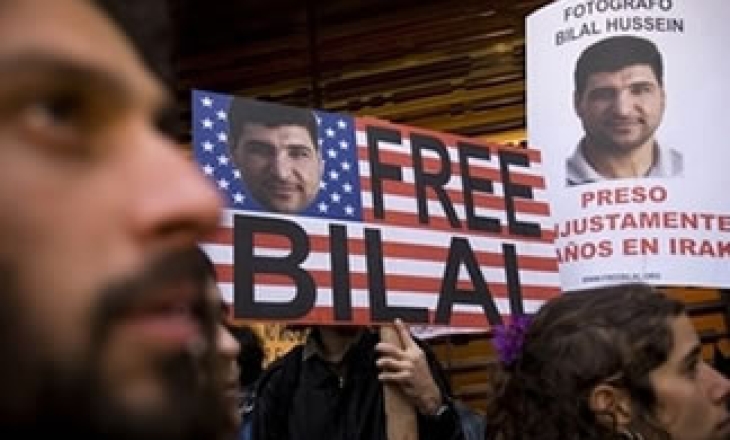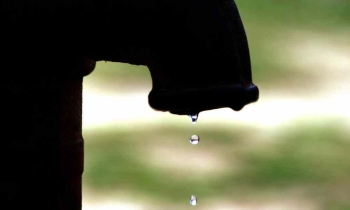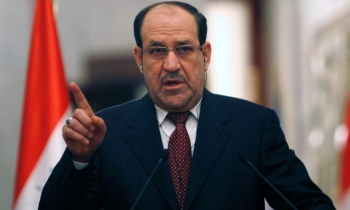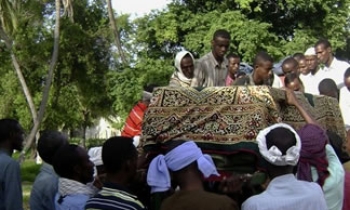An Iraqi judicial committee has dismissed terrorism-related allegations against Associated Press (AP) photographer Bilal Hussein and ordered him released nearly two years after he was detained by the US military, the news agency has reported. Hussein, 36, remained in custody Wednesday at Camp Cropper, a US detention facility near Baghdad's airport.
A decision by a four-judge panel said Hussein's case falls under a new amnesty law. It ordered Iraqi courts to "cease legal proceedings" and ruled that Hussein should be "immediately" released unless other accusations are pending. The ruling is dated Monday but AP's lawyers were not able to thoroughly review it until Wednesday. It was unclear, however, whether Hussein would still face further obstacles to release.
US military authorities have said a UN Security Council mandate allows them to retain custody of a detainee they believe is a security risk even if an Iraqi judicial body has ordered that prisoner freed. The UN mandate is due to expire at the end of this year. Moreover, AP said, the amnesty committee's ruling on Hussein may not cover a separate allegation that has been raised in connection with the case.
AP President Tom Curley hailed the committee's decision and demanded that the US military "finally do the right thing" and free Hussein. In response to a question from AP, Pentagon spokesman Bryan Whitman said it "will be up to officials in Iraq" on whether to release Hussein. The decision, he said, will be "based upon their assessment as to whether he remains a threat."
Under Iraq's 2-month-old amnesty law, a grant of amnesty effectively closes a case and does not assume guilt of the accused. Hussein has been held by the US military since being detained by Marines on April 12, 2006, in Ramadi, about 70 miles west of Baghdad. Throughout his incarceration, he has maintained he is innocent and was only doing the work of a professional news photographer in a war zone.
The amnesty committee's decision covers various allegations by the US military against Hussein, including claims he was in possession of bomb-making material, conspired with insurgents to take photographs synchronised with an explosion and offered to secure a forged ID for a terrorist evading capture by the military.
The committee may still be reviewing a separate allegation that Hussein had contacts with the kidnappers of an Italian citizen, Salvatore Santoro, whose body was photographed by Hussein in December 2004 with two masked insurgents standing over Santoro with guns.
Hussein was one of three journalists who were stopped at gunpoint by insurgents and taken by them to see the propped-up body. None of the journalists witnessed his death, said Santiago Lyon, AP's director of photography. AP wrote a story about the incident at the time.
AP said a review of Hussein's work and contacts also found no evidence of any activities beyond the normal role of a news photographer. Hussein was a member of an AP team that won a Pulitzer Prize for photography in 2005, and his detention has drawn protests from rights groups and press freedom advocates such as the Committee to Protect Journalists (CPJ).
"The Amnesty Committee took only a few days to determine what we have been saying for two years. Bilal Hussein must be freed immediately," said Curley, the AP's president. "The US military has said the Iraqi process should be allowed to work. It has, and the military must finally do the right thing by ending its detention of a journalist who did nothing more than his job. Bilal's imprisonment stands as a sad black mark on American values of justice and fairness," he added.
The US military referred the case in December to an investigating judge, who reviewed the evidence and submitted his findings to the Central Criminal Court of Iraq to determine whether the case should go to trial. In February, however, parliament approved a law providing amnesty to those held for insurgency-related offenses—including detainees such as Hussein who have never been convicted.
The committee from the Iraqi Federal Appeals Court ruled Monday that allegations against Hussein were covered by the Anti-Terrorist Law and were subject to the amnesty law. The order was sent to the Iraqi public prosecutor, but it was unclear if it had been received. A lawyer for AP was provided a copy of the order, but Wednesday was a public holiday in Iraq and government offices were closed.
The amnesty committee—or any Iraqi institution—cannot force the US military to release or turn over any of the estimated 23,000 detainees it holds in Iraq. But a provision in the amnesty law states that the Iraqi government "is committed to take the necessary measures to move the arrested people" from U.S. control.
"The detention of Bilal Hussein has been a terrible injustice, and we are relieved that his ordeal might finally come to an end after nearly two years behind bars," said Joel Simon, executive director of the Committee to Protect Journalists.
Sylvia Smith, president of the National Press Club in Washington, called the amnesty ruling "a long-overdue decision." "The next step is to free him," she said.
CPJ research shows that Hussein’s detention is not an isolated incident. Over the last four years, dozens of journalists—mostly Iraqis—have been detained by US troops. While most have been released after short periods, in at least eight cases documented by CPJ Iraqi journalists have been held by US forces for weeks or months without charge or conviction.
In one highly publicised case, Abdul Ameer Younis Hussein, a freelance cameraman working for CBS, was detained after being wounded by US military fire as he filmed clashes in Mosul in northern Iraq on April 5, 2005. US military officials claimed footage in his camera led them to suspect Hussein had prior knowledge of attacks on coalition forces. In April 2006, a year after his arrest, Hussein was freed after an Iraqi criminal court, citing a lack of evidence, acquitted him of collaborating with insurgents.
Worldwide, the US military continues to hold at least two other journalists without charge or due process. Al-Jazeera cameraman Sami al-Haj has been held at Guantánamo Bay, Cuba, after being detained in Pakistan in December 2001. CPJ outlined the case and called for due process in a special report in October 2006, “The Enemy?” The military is also holding Jawed Ahmad, a journalist for Canada’s CTV, at Bagram Air Base in Afghanistan. Ahmad has been held since October 26, 2007, according to CTV.










